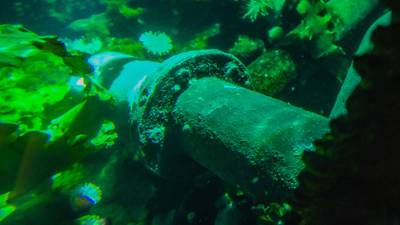The subsea control system is the nerve centre of the entire subsea factory.
Join our online Subsea Control course and gain a thorough awareness of how this system and its components operate, including the complex technology and risk and safety factors involved.
This course guides you through the requirements for, and design of, subsea electrical, electro-hydraulic, hydraulic and programmable control systems.
Whatever your engineering background, this course will help you specialise within or move into a career in the subsea industry.
You’ll gain highly sought-after expertise with a leading energy university and direct industry input from global subsea companies operating in the North Sea and beyond.

Build credits towards a Masters degree
This online course is part of:
You can use the credits you earn on this short course towards either of these MSc qualifications.
What you’ll study
It’s an area often dubbed a ‘magic art’, highly technical and understood by few. Break this mystery down and gain an essential introduction and foundation in the building blocks of subsea control.
Subsea control engineers need to be comfortable with a multitude of engineering concepts at the basic level. So you’ll cover concepts in:
- mechanical engineering
- electrical engineering
- chemical engineering
- environmental engineering
- civil and structural engineering
- hydraulics and other areas.
You’ll examine all aspects of subsea control technology, including electrical power. You’ll get to grips with subsea equipment, both topside and subsea. Your lectures will also cover:
- control fluids
- umbilical and control lines
- valves
- sensors
- sizing of hydraulics
- communications
- transmission through fibre optic cables.
You’ll study subsea standards and guidelines, with essential training in risk and safety.
You’ll also look ahead to future technologies, and tackle issues and challenges like obsolescence.
By the end of this course, you’ll be able to…
-
Describe the components and uses of a wide variety of subsea control systems.
-
Explain the requirements for, and design implications of, umbilicals and control lines (power and telemetry).
-
Model subsea power requirements.
-
Discuss the requirements and objectives of pre-commissioning, both at the factory and in situ.
-
Communicate the standards involved in the design of equipment.
-
Describe the design, control and application of manual and automatic shut-down valves, and emergency-response systems.
-
Investigate design of redundancy and the role of spare capacity.
-
Explain obsolescence management in subsea control systems.
How you’ll study
Online learning
This distance-learning Subsea Control course is delivered flexibly online. You can study with us anywhere in the world and manage your study hours to suit you.
Your teaching
This course is taught at Masters level.
Your training is delivered through MyAberdeen, our online Virtual Learning Environment (VLE). It holds all the materials, tools and support you’ll need in your studies. Take a look around MyAberdeen.
You can access your learning materials on computer, smartphone and laptop, 24 hours a day. You’ll find a range of resources at your fingertips, including:
- online lectures and tutorials
- reading materials
- discussion boards with your colleagues and tutors
- the online resources of our award-winning Sir Duncan Rice Library.
Your tutors
You’ll learn from tutors with experience at high levels of industry and major companies operating in the subsea and offshore sector.
Industry input
You’ll also benefit from an Industry Advisory Board. It constantly reviews course content to ensure you’re gaining the latest knowledge and are up to speed with emerging trends, technologies and career opportunities.
You’ll be assessed online. Assessment will take place throughout the teaching term.
Types of assessment for this course may include:
- coursework
- online quizzes
- timed online open-book assessments.
Assessment deadlines
Your assessments will have submission deadlines, either during or at the end of the course. Your course coordinator will let you know when your assessment deadlines are, so you can plan your study time accordingly.
The course totals approximately 150 hours of study and assessment time. That’s around 10 – 15 hours per week.
This is an indicative guide to the time required for a typical student at this level to achieve the learning outcomes.
You can largely set your own study hours each week to cover the materials. MyAberdeen is available 24/7, so you can log in and study when it suits you.
Activities at fixed times
There may be some activities scheduled for fixed times. This could include coursework and assessments with deadlines, or online meetings with your tutor. Otherwise, you can access and work through the course at your convenience.
Our first-class support structure will ensure that you aren’t alone in your studies. You’ll have contact with your course coordinator throughout your course. This could be by email, MyAberdeen, online call, or phone. You can use social media and discussion boards to chat with your fellow students too.
We provide a wide range of services to support you in your studies and beyond:
- Careers and Employability Service
- Disability support
- IT support
- Library support
- Student Support Service – help with finances, stress, wellbeing and non-academic issues
- Student Learning Service – study support, with advice sessions available via phone or Skype
- Aberdeen University Students’ Association (AUSA) – run by students for students
- Toolkit – clever apps and free training that can make your study life easier
Wherever you are in the world, you’ll feel part of our very special Aberdeen learning community.
Your course coordinator

Dr Antonios Karadimos
Antonios completed his PhD at Heriot-Watt University before entering the oil and gas industry as a riser analysis engineer. He spent over 10 years as a subsea team lead. Antonios worked on numerous projects involving the design and analysis of SURF systems, before becoming a lecturer here in subsea and decommissioning engineering.
View Antonios’ profileWhere this will take you
Towards a Masters
You’ll earn 15 credits at Masters level (SCQF Level 11) with this course. You can use these credits towards our:

Accredited Masters in Offshore Engineering
Join our accredited online MSc and gain the skills you need to work in a wide variety of roles in the offshore engineering sector, including marine renewables.
View MSc Offshore Engineering
Accredited Masters in Subsea Engineering
Become a subsea engineer with our accredited online MSc. Train in the fundamental skills and technical knowledge demanded by the subsea sector today.
View MSc Subsea EngineeringBuild your learning
We offer a range of specialist online Engineering and technology courses you can use to build your skills.
Many carry credits you can build up into postgraduate qualifications, including Masters degrees:
Careers
As a graduate from any engineering background, including electrical, civil, naval and mechanical, this course will prepare you for a specialist career within the subsea sector.
There’s benefit for those working in non-control areas of subsea too, such as umbilical engineering. You’ll gain an in-depth understanding of the interface between subsea control systems and your own professional area.
Continuing Professional Development (CPD)
Your employer or professional institute may recognise this course for CPD hours. Talk to your employer or institute to find out more.

Free career support
Access our free careers service while you study.
- 1:1 appointments
- CV checks
- Interview prep
- Job opportunities
Entry requirements
Entry requirements
We welcome students from all over the world.
This course has no formal entry requirements. You do not need to provide proof of your qualifications.
But you do need to check the entry guidance above to understand the level of teaching delivered, to decide if this course is right for you.
If you do not have qualifications from the UK, check the equivalent teaching level for your country.
Visa requirements
You do not need a student visa to study online with us.
English language requirements
Teaching is delivered in English.
You do not have to provide proof of your English language skills to join this course. But we want to make sure that you can use English well enough to study successfully.
Recommended level of English
For this course, we recommend the following level of English language proficiency.
These are our Postgraduate Standard requirements, and these are minimum scores.
IELTS Academic, IELTS UKVI Academic, and IELTS Online (not IELTS Indicator or IELTS General Training)
- 6.5 overall
- 5.5 for listening, reading and speaking
- 6.0 for writing
TOEFL iBT and TOEFL iBT Home Edition
- 90 overall
- 17 for listening
- 18 for reading
- 20 for speaking
- 21 for writing
- TOEFL DI code is 0818
Cambridge English: B2 First, C1 Advanced, or C2 Proficiency
- 176 overall
- 162 for listening, reading and speaking
- 169 for writing
LanguageCert Academic/LanguageCert Academic SELT
- 70 overall
- 60 for listening, reading and speaking
- 65 for writing
LanguageCert International ESOL B2 Communicator (Written and Spoken) – Online / In-centre
- Overall High Pass
- 33 for listening, reading and speaking
- 38 for writing
Oxford ELLT Digital – English Language Level Test Online
- 7.0 overall
- 5.0 for listening, reading and speaking
- 6.0 for writing
PTE Academic (online test not accepted)
- 62 overall
- 59 for listening, reading, speaking and writing
For full information about language requirements, see our English Language Requirements page.
You will need access to:
A computer (PC, laptop or Mac) operating on either:
- Windows 10 or later
- macOS 10.15 (Catalina) or later.
Most teaching materials are smartphone- and tablet-friendly. But we recommend a proper laptop or desktop for completing assignments comfortably.
Reliable internet access
We recommend:
- a wired connection
- a minimum download speed of 2 Mbps so you can take part fully in live sessions.
Speakers or headphones
- We recommend a headset with built-in microphone and earphones if you’re likely to study in an environment with background noise.
- A webcam is optional, but you may like to use one for some interactive sessions.
Software
We’ll give you access to Office365 applications. This means you can use online versions of Microsoft Word, Excel, and PowerPoint and install these programs on up to five personal devices.
If your course requires specialist software, we’ll provide you with access to this and a licence that lasts throughout your studies.
See our detailed IT requirements for more information.
When you study with us, you can expect a first-class support structure so that you’re never alone in your studies.
But learning online does mean you have to motivate yourself and manage your own time.
Your most important commitment will be time – the time to work through, reflect on and understand your teaching materials.
Before you start a course that involves a high degree of independent study, we recommend looking at the time you will be able to devote to your studies each week:
- Be realistic
- Create a weekly schedule as a guide
If you have any questions about studying online, get in touch with our friendly team. We’re here to help.
Fee payment
Your course fee needs to be paid in full before you start your course.
We accept payment via Visa Debit, Visa Credit and Mastercard.
Ways to save
You may be able to get help funding this course via:
- discounts – if any discounts are available for this course, they’ll appear in the section below
- employer sponsorship – we accept full and partial fee payments from sponsors.
Find out more about funding options.
Student card
All our students are entitled to a University of Aberdeen student card. This gives you access to a range of student discounts around the city and online.
This course has no formal entry requirements. You decide if it’s suitable for you.
The course is delivered at Masters level. At this level, you’d usually have at least:
- a 2:1 UK honours degree (or equivalent) in Engineering, Applied Mathematics or Physics, or
- three years’ relevant experience that supports this level of training.
Mathematical skills
This course includes significant mathematical content. Please review our mathematical skills document, which we’ve prepared to give you an indication of the level of mathematics you’ll require.
Apply for this course









